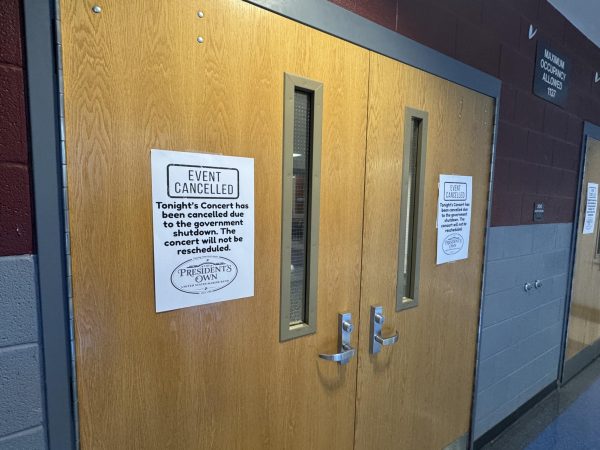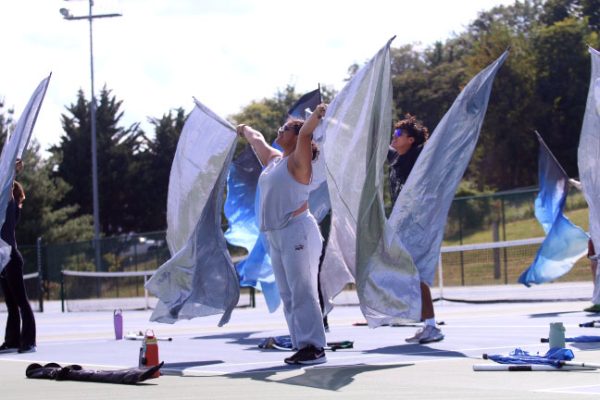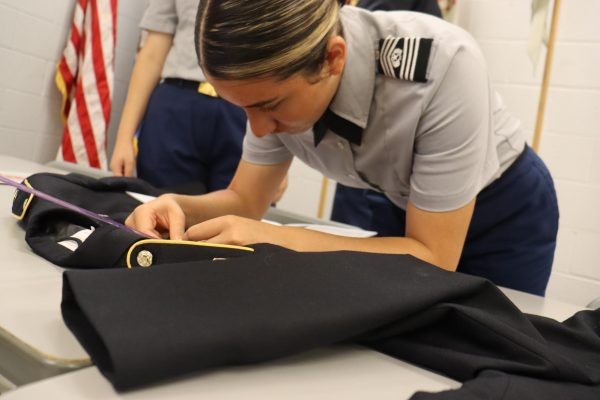House subcommittee kills bill to reaffirm student journalists’ first amendment rights
PHOTO COURTESY OF ANNA MITCHELL
Delegate Chris Hurst presents the House Bill 2382 to the Education Subcommittee on Jan. 28 to protect scholastic journalists from censorship.
Jan. 28, 2019 marked a loss for student publications across the state. In 1969, a Supreme Court case, Tinker vs. Des Moines, defined First Amendment rights for students in public schools across the country. It was a huge step for student press. Nine years later, another case, Hazelwood vs. Kuhlmeier, sent students stumbling two steps back by declaring that they did in fact shed some of their constitutional rights at the schoolhouse gate.
New legislation, deemed a “New Voices” bill, would have protected “school-sponsored media,” which includes any material “prepared, substantially written, published or broadcast” by student journalists. In a 3-3 deadlock tie after testimony, the bill, HB 2382, failed.
After advisor Valerie Kibler contacted Roger Soenksen, a professor in JMU’s School of Media and Arts Design, he immediately jumped into action to work with other educators throughout Virginia in order to rally support for the legislation. Although he knew it would be a tough win, Soenksen had hoped that the overwhelming support for the bill would sway committee members.
“I was a bit disappointed. I figured there would be opposition, but I thought the bill would be beaten by strong arguments if it was defeated in the committee,” Soenksen said. “I really think the arguments… articulated against the bill simply won’t withstand scrutiny by supporters of this legislation. After a short time of disappointment, I was filled with a renewed energy to get this legislation passed and enacted.”
Delegate Tony Wilt, representative for Harrisonburg and part of Rockingham county, was one of several house members that supported the bill. Although Wilt did not serve on the committee responsible for its death, and therefore did not get the opportunity to hear testimony regarding the legislation in questions, he can see where the bill fell short.
 “I agree generally that students should have the latitude and freedom to publish what they wish, free from unnecessary censorship; however, there are some factors unique to student journalism that might have caused concern for those that opposed the legislation in the committee. The fact that both the journalists and readers are minors under the supervision of the school system may have been a factor for some,” Wilt said. “In addition, given the assumption that most schools probably only have one main media source/publication, perhaps there were concerns about the lack of the ability for students to seek out alternative information [or] viewpoints, unlike the broader media market… Introduced legislation was a fairly broad and comprehensive. Perhaps a more narrowly drawn bill may ease some concerns and stand a better chance of success in the future.”
“I agree generally that students should have the latitude and freedom to publish what they wish, free from unnecessary censorship; however, there are some factors unique to student journalism that might have caused concern for those that opposed the legislation in the committee. The fact that both the journalists and readers are minors under the supervision of the school system may have been a factor for some,” Wilt said. “In addition, given the assumption that most schools probably only have one main media source/publication, perhaps there were concerns about the lack of the ability for students to seek out alternative information [or] viewpoints, unlike the broader media market… Introduced legislation was a fairly broad and comprehensive. Perhaps a more narrowly drawn bill may ease some concerns and stand a better chance of success in the future.”
The bill’s original patrons included Delegates Chris Hurst and Danica Roem, both of whom had previous experience in journalism. With an increasing number of censorship cases flooding the commonwealth in the recent years, Hurst felt the need to aid student journalists in gaining back their First Amendment rights.
“I believe that any journalist who has studied the craft understands the need to have protection for a journalist. You need the light of the First Amendment to uncover problems that face our society today,” Soenksen said.
Chris Waugaman, advisor of the Royals Media at Prince George’s High School, brought several students, including Maddison Shawkey and Carter Marks, to testify. Waugaman felt having students attend the event first-hand reflected their knowledge of journalism and gave an important learning experience.
“I believe that in a public institution there needs to be accountability. The people most affected by the decisions being made in a school are usually the students, so their voices need to be heard… I teach the history of the Hazelwood and Tinker cases each year, and I think the students understand it in small pieces and then forget the significance of them. When the students were forced to approach subcommittee members and defend this bill they had to be knowledgeable of the law and these cases,” Waugaman said. “I have never seen a situation where the application of learned information was on display more. In fact, they argued with one delegate because he was somewhat misinformed about the nature of what this bill was proposed to do.”
Shawkey and Marks delivered their testimonies about the fear of censorship and ways the administration use this fear to dissuade a free student press. For Shawley, the experience wasn’t only informative regarding journalism, but the process behind bills as well.
“This experience was extremely eye opening. I didn’t realize how ignorant I was to the process of passing or failing bills and lobbying. I got to speak to some really intimidating people and I learned that, as a student… you have obstacles as soon as you walk in because they see you as a kid,” Shawkey said. “We are journalists, so while I didn’t personally experience this from the people I talked to, there were some people that we lobbied to that had some negative opinions on journalists and what we do. I had never really faced any kind of discrimination like that before.”
Waugaman’s students spent most of the day in Richmond lobbying before attending the meeting. According to Marks, other than HB 2382, only allowed extra time due to the testimonies given, each bill was given a maximum of five to seven minutes, a process that seemed very rushed.
Marks believes the bill will pass in the next five years, and until then, will continue to do what he can to make a difference.
“I was hoping that us students being there to support the bill would be more of an impact then an average adult that they see daily as a lobbyist… I don’t know what we’ll do in the next couple of months, but next year we will be right back in the sub-committee room to testify in support of the bill ” Marks said.
Waugaman also has high hopes for the bill and is confident that it will pass in the future.
“I think this bill still has a great chance in [Virginia]. We have two delegates who are firmly behind it, and several patrons too. I also am encouraged by the fact that we received three yes votes from the subcommittee already. I think we need to reach out to the three organizations who stood in opposition to the bill and see if we can work on legislation that they might be able to support as well. And if we cannot get them to support the bill, to at least get them to not oppose it,” Waugaman said.
Fourteen different states have already ratified New Voices. Virginia would have been the fifthteenth. Soenksen’s hope for this bill stems from his view on its necessity.
“Accurate, truthful information should never be feared. I truly believe that students do not lose their First Amendment rights as they enter the hallways of their school,” Soenksen said. “Student journalists learn about their discipline by practicing good, balanced reporting. They have to be exposed to making tough calls early in their careers in order to develop their critical thinking skills.”
Your donation will support the student journalists of Harrisonburg High School. Your contribution will allow us to purchase equipment and cover our annual website hosting costs.












